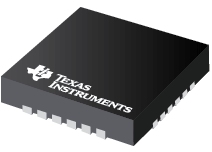Datasheet Texas Instruments DS100BR210SQ/NOPB
| Manufacturer | Texas Instruments |
| Series | DS100BR210 |
| Part Number | DS100BR210SQ/NOPB |

Low Power 10.3 Gbps 2-Ch Repeater w/ Input Equalization and Output De-Emphasis 24-WQFN -40 to 85
Datasheets
DS100BR210 Ultra Low Power 10.3 Gbps 2-Channel Repeater with Input Equalization and Output De-Emphasis datasheet
PDF, 1.9 Mb, Revision: E, File published: Jan 29, 2015
Extract from the document
Prices
Status
| Lifecycle Status | Active (Recommended for new designs) |
| Manufacture's Sample Availability | No |
Packaging
| Pin | 24 |
| Package Type | RTW |
| Industry STD Term | WQFN |
| JEDEC Code | S-PQFP-N |
| Package QTY | 1000 |
| Carrier | SMALL T&R |
| Device Marking | BR210 |
| Width (mm) | 4 |
| Length (mm) | 4 |
| Thickness (mm) | .75 |
| Pitch (mm) | .5 |
| Max Height (mm) | .8 |
| Mechanical Data | Download |
Parametrics
| Application | Front Port, Backplane, Peripheral I/O |
| Device Type | Repeater |
| Input Compatibility | AC-Coupled,CML |
| Number of Channels | 2 |
| Operating Temperature Range | -40 to 85 C |
| Package Group | WQFN |
| Protocols | 10G-SR/LR,10G-CR,10G-KR,SAS1,SAS2,SATA1,SATA2,SATA3,Infiniband,FibreChannel,CPRI,OBSAI,Interlaken,sRIO,General Purpose |
| Speed(Max) | 10.3 Gbps |
| SupplyVoltage | 3.3,2.5 Volt |
Eco Plan
| RoHS | Compliant |
Design Kits & Evaluation Modules
- Evaluation Modules & Boards: DS100BR210EVK
DS100BR210EVK Evaluation Module
Lifecycle Status: Active (Recommended for new designs)
Application Notes
- Understanding EEPROM Programming for High Speed Repeaters and Mux BuffersPDF, 317 Kb, File published: Oct 9, 2014
System designers often use EEPROM (Electrically Erasable Programmable Read-Only Memory) to program a set of customized high speed repeater and mux buffer start-up settings that are different from the default. Using the information here will make repeater EEPROM configuration and programming easy to implement and understand. This application note addresses SMBus-to-EEPROM mapping for 2-channel repe
Model Line
Series: DS100BR210 (2)
- DS100BR210SQ/NOPB DS100BR210SQE/NOPB
Manufacturer's Classification
- Semiconductors > Interface > Ethernet > Ethernet Retimers, Redrivers/Repeaters and MUX Buffers
